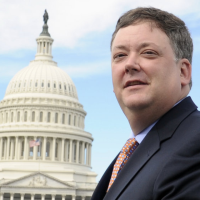Supreme Court’s Lifting of Campaign Donation Caps Ripples Down through the States
 Shaun McCutcheon (photo: Susan Walsh, AP)
Shaun McCutcheon (photo: Susan Walsh, AP)
The decision Wednesday by the U.S. Supreme Court that struck limits on aggregate donations to individual candidates will have a huge effect on federal elections. But states are also starting to change their rules on campaign donations to conform with the ruling.
The decision said that at the federal level, a donor may still give no more than $2,600 to a candidate per election, no more than $5,000 per year to a single political action committee (PAC) and no more than $32,400 to a national party committee. But there is no longer a limit on how many candidates, party committees or PACs to which a single person can donate.
Thirteen states have some kind of restrictions on aggregate donations to candidates. Massachusetts was the first of these to strike its rule limiting donations to specific candidates to $12,500, according to The Washington Post. The state is still deciding whether the decision also applies to its limit of $5,000 in gifts to state political parties is still viable.
Donald McGahn, a Republican campaign finance attorney at Patton Boggs and a former chairman of the Federal Election Commission, told the Post that those limits will probably also go by the wayside. “The McCain-Feingold restrictions on state and local parties are still there, yet the rationale for upholding all those limitations that was offered in McConnell v. FEC is gone,” McGahn said, referring to the 2003 case that upheld most of the McCain-Feingold legislation. “[It's] only a matter of time before those party restrictions fall.”
Maryland might be next on the bandwagon. Jared DeMarinis, director of the Maryland Board of Elections’ candidacy and campaign finance division, told the Center for Public Integrity that the agency will issue new guidance “as soon as possible,” adding that “we won’t be waiting for a court case to see if the law is enforceable.”
Other states with aggregate limits are Alaska, Connecticut, Kentucky, Louisiana, Maine, Minnesota, New York, Rhode Island, Washington, Wisconsin and Wyoming.
Not all observers say that elimination of limits on aggregate giving to parties is a slam dunk. Paul S. Ryan, an attorney at the Campaign Legal Center, which encourages the implementation of campaign finance reform, said state caps on what percentage of money candidates collect from political parties or from PACs may not be “automatically invalid.” He did have a word of warning, however.
“I wouldn’t consider any campaign finance law safe with this Supreme Court,” he said.
-Steve Straehley
To Learn More:
States Will Rethink Aggregate Limits After McCutcheon (by Reid Wilson, Washington Post)
More Than A Dozen States Could Throw Out Donation Caps After McCutcheon Ruling (by Michael Beckel, Center for Public Integrity)
- Top Stories
- Unusual News
- Where is the Money Going?
- Controversies
- U.S. and the World
- Appointments and Resignations
- Latest News
- Musk and Trump Fire Members of Congress
- Trump Calls for Violent Street Demonstrations Against Himself
- Trump Changes Name of Republican Party
- The 2024 Election By the Numbers
- Bashar al-Assad—The Fall of a Rabid AntiSemite






Comments